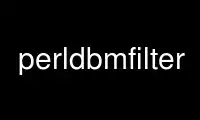
This is the command perldbmfilter that can be run in the OnWorks free hosting provider using one of our multiple free online workstations such as Ubuntu Online, Fedora Online, Windows online emulator or MAC OS online emulator
PROGRAM:
NAME
perldbmfilter - Perl DBM Filters
SYNOPSIS
$db = tie %hash, 'DBM', ...
$old_filter = $db->filter_store_key ( sub { ... } );
$old_filter = $db->filter_store_value( sub { ... } );
$old_filter = $db->filter_fetch_key ( sub { ... } );
$old_filter = $db->filter_fetch_value( sub { ... } );
DESCRIPTION
The four "filter_*" methods shown above are available in all the DBM modules that ship
with Perl, namely DB_File, GDBM_File, NDBM_File, ODBM_File and SDBM_File.
Each of the methods works identically, and is used to install (or uninstall) a single DBM
Filter. The only difference between them is the place that the filter is installed.
To summarise:
filter_store_key
If a filter has been installed with this method, it will be invoked every time you
write a key to a DBM database.
filter_store_value
If a filter has been installed with this method, it will be invoked every time you
write a value to a DBM database.
filter_fetch_key
If a filter has been installed with this method, it will be invoked every time you
read a key from a DBM database.
filter_fetch_value
If a filter has been installed with this method, it will be invoked every time you
read a value from a DBM database.
You can use any combination of the methods from none to all four.
All filter methods return the existing filter, if present, or "undef" if not.
To delete a filter pass "undef" to it.
The Filter
When each filter is called by Perl, a local copy of $_ will contain the key or value to be
filtered. Filtering is achieved by modifying the contents of $_. The return code from the
filter is ignored.
An Example: the NULL termination problem.
DBM Filters are useful for a class of problems where you always want to make the same
transformation to all keys, all values or both.
For example, consider the following scenario. You have a DBM database that you need to
share with a third-party C application. The C application assumes that all keys and values
are NULL terminated. Unfortunately when Perl writes to DBM databases it doesn't use NULL
termination, so your Perl application will have to manage NULL termination itself. When
you write to the database you will have to use something like this:
$hash{"$key\0"} = "$value\0";
Similarly the NULL needs to be taken into account when you are considering the length of
existing keys/values.
It would be much better if you could ignore the NULL terminations issue in the main
application code and have a mechanism that automatically added the terminating NULL to all
keys and values whenever you write to the database and have them removed when you read
from the database. As I'm sure you have already guessed, this is a problem that DBM
Filters can fix very easily.
use strict;
use warnings;
use SDBM_File;
use Fcntl;
my %hash;
my $filename = "filt";
unlink $filename;
my $db = tie(%hash, 'SDBM_File', $filename, O_RDWR|O_CREAT, 0640)
or die "Cannot open $filename: $!\n";
# Install DBM Filters
$db->filter_fetch_key ( sub { s/\0$// } );
$db->filter_store_key ( sub { $_ .= "\0" } );
$db->filter_fetch_value(
sub { no warnings 'uninitialized'; s/\0$// } );
$db->filter_store_value( sub { $_ .= "\0" } );
$hash{"abc"} = "def";
my $a = $hash{"ABC"};
# ...
undef $db;
untie %hash;
The code above uses SDBM_File, but it will work with any of the DBM modules.
Hopefully the contents of each of the filters should be self-explanatory. Both "fetch"
filters remove the terminating NULL, and both "store" filters add a terminating NULL.
Another Example: Key is a C int.
Here is another real-life example. By default, whenever Perl writes to a DBM database it
always writes the key and value as strings. So when you use this:
$hash{12345} = "something";
the key 12345 will get stored in the DBM database as the 5 byte string "12345". If you
actually want the key to be stored in the DBM database as a C int, you will have to use
"pack" when writing, and "unpack" when reading.
Here is a DBM Filter that does it:
use strict;
use warnings;
use DB_File;
my %hash;
my $filename = "filt";
unlink $filename;
my $db = tie %hash, 'DB_File', $filename, O_CREAT|O_RDWR, 0666,
$DB_HASH or die "Cannot open $filename: $!\n";
$db->filter_fetch_key ( sub { $_ = unpack("i", $_) } );
$db->filter_store_key ( sub { $_ = pack ("i", $_) } );
$hash{123} = "def";
# ...
undef $db;
untie %hash;
The code above uses DB_File, but again it will work with any of the DBM modules.
This time only two filters have been used; we only need to manipulate the contents of the
key, so it wasn't necessary to install any value filters.
Use perldbmfilter online using onworks.net services